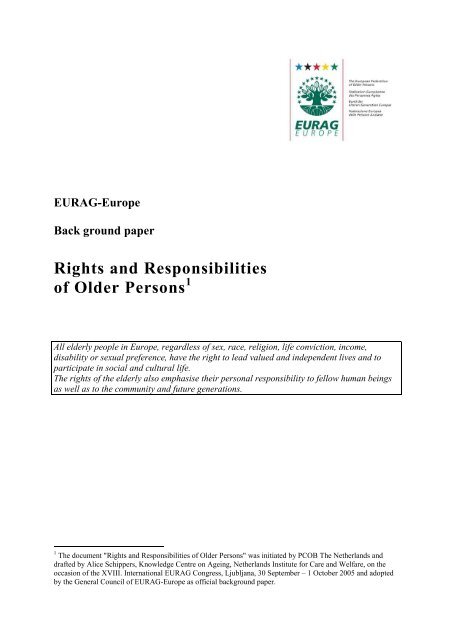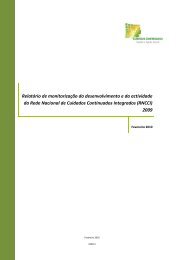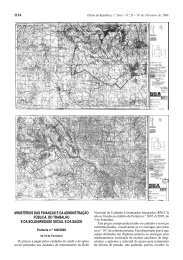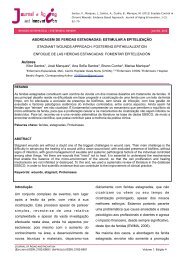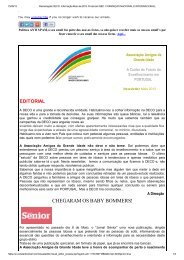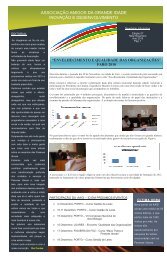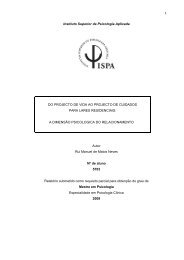Rights and Responsibilities of Older Persons - AAGI-ID Associação ...
Rights and Responsibilities of Older Persons - AAGI-ID Associação ...
Rights and Responsibilities of Older Persons - AAGI-ID Associação ...
You also want an ePaper? Increase the reach of your titles
YUMPU automatically turns print PDFs into web optimized ePapers that Google loves.
EURAG-EuropeBack ground paper<strong>Rights</strong> <strong>and</strong> <strong>Responsibilities</strong><strong>of</strong> <strong>Older</strong> <strong>Persons</strong> 1All elderly people in Europe, regardless <strong>of</strong> sex, race, religion, life conviction, income,disability or sexual preference, have the right to lead valued <strong>and</strong> independent lives <strong>and</strong> toparticipate in social <strong>and</strong> cultural life.The rights <strong>of</strong> the elderly also emphasise their personal responsibility to fellow human beingsas well as to the community <strong>and</strong> future generations.1 The document "<strong>Rights</strong> <strong>and</strong> <strong>Responsibilities</strong> <strong>of</strong> <strong>Older</strong> <strong>Persons</strong>" was initiated by PCOB The Netherl<strong>and</strong>s <strong>and</strong>drafted by Alice Schippers, Knowledge Centre on Ageing, Netherl<strong>and</strong>s Institute for Care <strong>and</strong> Welfare, on theoccasion <strong>of</strong> the XVIII. International EURAG Congress, Ljubljana, 30 September – 1 October 2005 <strong>and</strong> adoptedby the General Council <strong>of</strong> EURAG-Europe as <strong>of</strong>ficial background paper.
IntroductionEuropean society is aging, maturing, greying <strong>and</strong> becoming more individualistic. People’s lifeexpectancy is increasing. In combination with the post-war baby boom, this results in agrowing number <strong>of</strong> elderly in Europe. Furthermore, the number <strong>of</strong> aging immigrants isgrowing. In recent decades, couples are having fewer children <strong>and</strong>, as a consequence <strong>of</strong> this,the working population, the percentage <strong>of</strong> people between the ages <strong>of</strong> 15 <strong>and</strong> 65, is becomingcomparatively smaller. The chance exists that these developments will lead tointergenerational tensions. On account <strong>of</strong> the changed demographic composition, we are welladvised to give the social position <strong>of</strong> the elderly some consideration. This Charter <strong>of</strong>fersseniors a means by which to enter into the discussion with governmental authorities <strong>and</strong>organisation at various levels. However, the Charter also appeals to the active commitment <strong>of</strong>the older members <strong>of</strong> the community as well as their involvement with others.Social security, protection from the environment, the availability <strong>and</strong> accessibility <strong>of</strong> careinstitutions, housing, the right to social <strong>and</strong> cultural development, leisure-time activities <strong>and</strong>education are basic social rights that apply to everyone. The st<strong>and</strong>ards established in theUniversal Declaration <strong>of</strong> Human <strong>Rights</strong> <strong>and</strong> the international agreements about human rightsalso pertain to all population groups. These fundamental human rights remain in effect aspeople age <strong>and</strong> apply without limitation to the oldest <strong>and</strong> most vulnerable group <strong>of</strong> the elderly<strong>and</strong> to older persons who are restricted in their ability to function. The United NationsInternational Plan <strong>of</strong> Action on Aging (Madrid 2002) also applies to seniors living in Europe.The income position, educational level <strong>and</strong> life situation <strong>of</strong> the elderly vary widely. Theremay even be increasingly greater diversity. The st<strong>and</strong>ard life, which consisted <strong>of</strong> school, work<strong>and</strong> pension for men <strong>and</strong>, conventionally, school <strong>and</strong> care for women, has been replaced byless unambiguous <strong>and</strong> predictable patterns. As a consequence <strong>of</strong> the better living conditions,seniors remain healthier longer, even well into old age. However, the increased length <strong>of</strong> life<strong>and</strong> the greying <strong>of</strong> the population also cause the number <strong>of</strong> vulnerable older people to grow.At advanced age, the elderly can encounter limitations that result in loss <strong>of</strong> control over theirlives or the threat <strong>of</strong> such loss. Growing older requires adjustment to changed circumstances<strong>and</strong> the learning <strong>of</strong> ways to implement practical solutions. Loss <strong>of</strong> self-reliance must be as faras possible avoided <strong>and</strong> quality <strong>of</strong> life must be safeguarded in all phases <strong>of</strong> life.EURAG intends to translate social concepts into practices that benefit seniors. Respect <strong>and</strong>consideration for each other, justice, equality, solidarity with weaker members <strong>of</strong> thecommunity <strong>and</strong> the striving for a measure <strong>of</strong> humanity are at the core <strong>of</strong> its enterprise. In thevision <strong>of</strong> EURAG, older persons not only have rights but also responsibilities. They have aresponsibility to the community as a whole <strong>and</strong> to the generations that come after them. Theresponsibilities <strong>of</strong> the elderly entail the making <strong>of</strong> productive contributions to society. This isappropriate to a longer active phase <strong>of</strong> life, one that involves paid work, as well as volunteeractivities <strong>and</strong> informal care. A positive image <strong>of</strong> the elderly is important because the way inwhich the community regards it older members partly determines the manner in which theyare treated <strong>and</strong> the extent to which they are able to participate in society.Vulnerable older people, individuals who are not sufficiently self-reliant, have a right to care<strong>and</strong> deserve protection. This however does not apply to all <strong>of</strong> the older population group. It isEURAG’s view that the elderly themselves are, first <strong>of</strong> all, responsible for finding solutions totheir problems <strong>and</strong> for creating a living environment meant to last a lifetime.2
Increasing rightsDiminishing possibilities <strong>of</strong>self-sufficiency Vigorous <strong>and</strong>independentDependent due toreduced vitality<strong>Rights</strong> <strong>and</strong> <strong>Responsibilities</strong>Autonomy <strong>and</strong> self-determination– The elderly have the right to autonomy <strong>and</strong> control over their own lives.– The elderly have the right to free movement. Sufficiently affordable means <strong>of</strong>transportation must be accessible to older people with limitations. Elderly personswith limitations have the right to support ins<strong>of</strong>ar as mobility is concerned.– Within the limits set by applicable laws, the elderly have the right to make their owndecisions about starting, continuing or terminating medical treatment.– The elderly have the right to person-oriented care based on individual wishes <strong>and</strong>suited to their manner or style <strong>of</strong> life.Respect for the elderly– The elderly have the right to participate in a community that treats them with respect<strong>and</strong> allows them their value.– The elderly have the responsibility to fulfil their social roles in accordance with theirabilities. In this way, they can provide an effective contribution to a positive image <strong>of</strong>older people.– Even when living in independent circumstances, older people have their rights <strong>and</strong>responsibilities, including the right to decide about their own quality <strong>of</strong> life.Equal treatment– Age discrimination is prohibited. Age limits do not provide the basis for anyjudgement concerning the opportunities <strong>of</strong> individuals.– The elderly have the right to equal treatment ins<strong>of</strong>ar as the sharing <strong>of</strong> living space isconcerned. Age does not alter the need for housing meant to last a lifetime.– The elderly have the right to perform (volunteer) work in accordance with theircapacities. Age has no influence on an individual's aptitude to perform (volunteer)work.– Financial provisions <strong>and</strong> tax-related issues must also be applicable to persons over theage <strong>of</strong> 65.Social participation– The elderly have the right <strong>and</strong> the responsibility to participate in society <strong>and</strong> to make acontribution to the community in ways according to their capacities.– The elderly have the right <strong>and</strong> the responsibility to share their values, st<strong>and</strong>ards,knowledge, life-experience <strong>and</strong> skills with younger generations.3
– <strong>Older</strong> employees have the right <strong>and</strong> the responsibility to participate in trainingprograms, schooling <strong>and</strong> the advancement <strong>of</strong> expertise in order to keep theirknowledge <strong>and</strong> skills up to date.– Opportunities must be <strong>of</strong>fered for a gradual transition from work to retirement.Retirement age must be made flexible.– Companies must give some consideration to aging employees <strong>and</strong> create flexibleworking conditions so to prevent work disruptions.– The elderly who perform volunteer work have the right to compensation for expenses,legal protection <strong>and</strong> guidance.Active citizenship– Just like other citizens, the elderly have the responsibility <strong>of</strong> contributing, inaccordance with their capacities, to the financing <strong>of</strong> the social security system <strong>and</strong>community services.– The elderly must be able to exercise their democratic rights at all levels <strong>and</strong> areresponsible for making their voices heard.– The elderly who are able to do so have the responsibility <strong>of</strong> making themselvesavailable for political <strong>and</strong> social functions.– The elderly have the right to form organisations to promote their material <strong>and</strong>immaterial interests.– The elderly have the right to have their own representatives to protect their owninterests.Financial security– Just like other citizens, the elderly contribute, in accordance with their own capacities,to the financing <strong>of</strong> community services.– The elderly have the right to financial security <strong>and</strong> an income that is related to salarydevelopments. This also applies to single women <strong>and</strong> older immigrants.– The elderly have the right to enjoy economic independence <strong>and</strong> to manage their ownfinances. This responsibility may only be taken from them in cases <strong>of</strong> incompetence.Personal development, social contact <strong>and</strong> meaningfulness– The elderly have the right to personal development, social contact <strong>and</strong> meaningfullives. They must have access to educational programmes, schooling <strong>and</strong> all levels <strong>of</strong>training in order to both maintain <strong>and</strong> improve their knowledge <strong>and</strong> skills.– The elderly have the right to their own views on life.– The elderly have the right to spiritual care <strong>and</strong> must be able to attend church services<strong>and</strong> other religious assemblies.– The elderly have the right to their own social network. They have the right to establishsocial relationships <strong>and</strong> to maintain contact with children, gr<strong>and</strong>children, other next <strong>of</strong>kin <strong>and</strong> friends.– The elderly have the right <strong>of</strong> access to culture activities, leisure-time activities <strong>and</strong>sport facilities, all tailored to suit their wishes <strong>and</strong> needs.Access to information– The elderly have the right to the information enabling them to make decisions forthemselves <strong>and</strong> to maintain control over their lives. They are furthermore responsiblefor familiarising themselves with such information.– The elderly have the right to information about a healthy way <strong>of</strong> life <strong>and</strong> arethemselves responsible for a healthy <strong>and</strong> active manner <strong>of</strong> living.4
– The elderly have the right to participate in courses that promote self-reliance <strong>and</strong> ablebodiness.– The elderly are responsible for informing themselves about modern informationtechnology <strong>and</strong> have the right to participate in courses on this subject.– In developing information technology <strong>and</strong> other technological applications,consideration must be given to their accessibility for older persons.Housing <strong>and</strong> living environment– The elderly are themselves responsible for securing a suitable housing situation <strong>and</strong>have the right to a physical <strong>and</strong> social infrastructure that make it possible to continueliving in a self-supporting manner for as long as possible.– The elderly have the right to security inside <strong>and</strong> outside their homes. This implies anadequate application <strong>of</strong> communication technology.– If necessary, the elderly have the right to live in a protected residential environment inwhich an adequate level <strong>of</strong> care is guaranteed.Care <strong>and</strong> service provision geared to a good quality <strong>of</strong> life– The elderly have the right to care that contributes to a good quality <strong>of</strong> life.– In the last phase <strong>of</strong> their lives, the elderly have a right to palliative care <strong>and</strong> torecognition <strong>of</strong> any wish to die in a dignified manner, as log as it complies withexisting laws.– The elderly have the right to treatment for psychiatric illness <strong>and</strong> to counselling aboutpsycho-social problems.– Partners, family members <strong>and</strong> other volunteer aids that take care <strong>of</strong> vulnerable olderpeople have a right to support.ConclusionsCommunal life involves living with each other in a caring <strong>and</strong> respectful manner. Thisrequires solidarity between young <strong>and</strong> old, rich <strong>and</strong> poor, sick <strong>and</strong> healthy, dependent <strong>and</strong>independent. Living in a community requires an investment from everyone, even the elderly.The rights <strong>and</strong> responsibilities in the Charter open the way to further development <strong>and</strong> socialparticipation for the elderly. <strong>Rights</strong> also entail responsibilities <strong>and</strong> presuppose an outlookconcerned with one's fellow human beings <strong>and</strong> with society. It is for this reason that thecharter is both for the elderly <strong>and</strong>, simultaneously, a task imposed on the elderly.5


